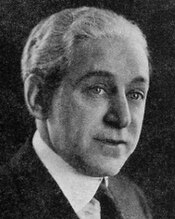Harry Reichenbach
| Harry Reichenbach | |
|---|---|

Harry Reichenbach
|
Harry Reichenbach (1882–1931) was a US press agent and publicist who dreamed up sensational publicity stunts to promote films. He worked both for actors, as an agent, and for the studios as a promoter. He was one of the founding members of the Associated Motion Picture Advertisers.
Among his first jobs was to promote a woman called "Sober Sue" who never smiled. He got her a contract at the Victoria Theater on Broadway and made them offer $1000 to any New York comedian who could make her laugh. Actually, the woman had Mobius syndrome—i.e. paralyzed face muscles—so she was incapable of laughter.
Between 1914-1916 he served as publicity director for various motion picture companies: Jesse L. Lasky Feature Play Co., Alco Film Corp., Bosworth Inc.,Metro Pictures, Equitable Motion Picture Corp.,World Film Co., and Frohman Amusement Corp.
In December 1916 Reichenbach founded his own public relations company. Reichenbach claims to have popularized the painting September Morn, but that story is disputed.
To promote the sequel the Return of Tarzan, Reichenbach hired an actor who checked into the Hotel Bellclaire with a name Thomas R. Zann. Zann had a huge crate that was hoisted to his room through a window. Then he ordered fifteen pounds of raw beef. When the cook and the hotel detective arrived, they saw that the meat was for the guest's pet lion. Hotel called for police and the "Mr Zann" explained to them and the press that he was a huge Tarzan fan.
One of the actors Reichenbach worked for was Rudolf Valentino. Reichenbach convinced him to grow beard to cause a bad reaction that was followed by a good one when he "agreed" to shave it.
For the 1915 film Trilby, which included nude scenes and hypnotism, Reichenbach hired a young woman to run several times around the block and take a seat besides him just before the movie ended. She looked agitated and exhausted and Reichenbach hinted that the hypnosis scenes in the movie might have something to do with it. He also arranged that various psychologists would speculate on possible effects of hypnosis through cinema.
...
Wikipedia
